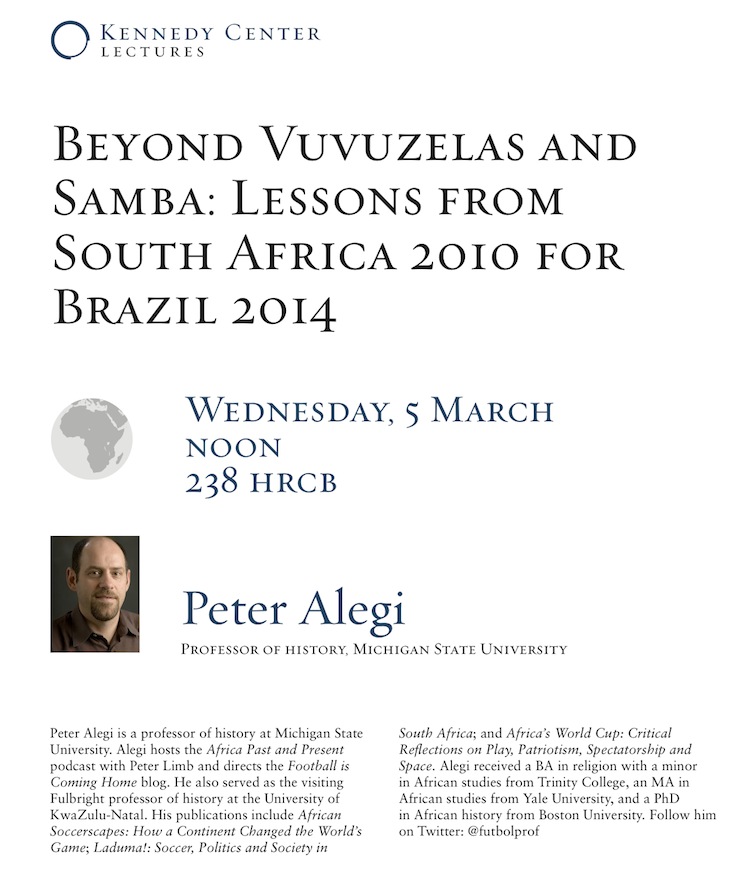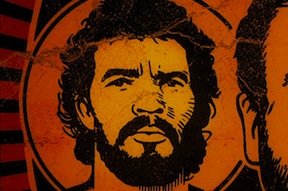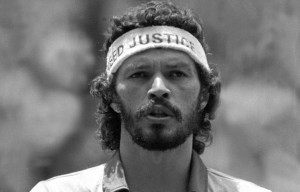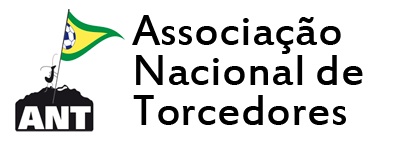 Listen to “Beyond Vuvuzelas and Samba: Lessons from South Africa 2010 for Brazil 2014,” a lecture I delivered at Brigham Young University’s David M. Kennedy Center for International Studies on March 5, 2014.
Listen to “Beyond Vuvuzelas and Samba: Lessons from South Africa 2010 for Brazil 2014,” a lecture I delivered at Brigham Young University’s David M. Kennedy Center for International Studies on March 5, 2014.
The talk analyzes the political, economic, and cultural dynamics of the 2010 FIFA World Cup in South Africa and its similarities to the upcoming 2014 FIFA World Cup in Brazil.
Click here to watch the video.
Tag: Brazil
Futebol Nation: The Story of Brazil
The Garrincha of futbology, David Goldblatt, admits he’s neither Brazilian nor a Brazilianist as he begins his recent public lecture at Pitzer College in California.
Then, like Garrincha, he feigns left, goes right through through Brazil’s World Cup history, pivots on slavery, Lusotropicalism and GINI coefficients, does a give-and-go with Mario Filho, dribbles around Benedict Anderson, reaches the Maracanazo touchline, and delivers a cross into the Vinegar Revolt of 2013.
Eduardo Galeano has written that “in the history of soccer no one made more people happy” than Garrincha. It’s not too much of a stretch to say that in the field of futbology the same is true for David Goldblatt.
Police in riot gear battle protestors in the streets of Rio de Janeiro. Aggressive slum clearance threatens favelas. Gentrification at Maracanã Stadium. FIFA exclusion zones around World Cup venues. Sound familiar?
As readers of this blog know, South Africa staged a successful World Cup in 2010, marketing the country globally to tourists and foreign investors, and uniting, albeit temporarily, a nation divided along racial and economic fault lines. South Africa’s experience was part of a larger trend, that of BRICS countries enthusiastically embracing the global mega sporting events business: from Beijing (2008 Summer Olympics) and Delhi (2010 Commonwealth Games) to Brazil (2014 World Cup and 2016 Olympics) and Russia (2014 Winter Games [Sochi] and 2018 World Cup).
Recent media coverage of Brazil’s preparations reveals growing FIFA unease with delays in infrastructure construction projects and other hosting problems. Speaking at a FIFA academic symposium last week, FIFA General Secretary Jerome Valcke expressed frustration with Brazil’s government, saying that “less democracy is sometimes better for organizing a World Cup,” according to a Reuters wire story. Valcke’s extraordinary remark confirmed some experts’ suspicions about FIFA’s underlying rationale for choosing autocratic Russia and Qatar (2022) as World Cup hosts.
Another story about 2014 World Cup stadiums was published in the New York Times Goal blog. James Young’s “White Elephant Hunting in Brazil” highlighted the importance of staging matches across the country. It concluded that while there were some troubling questions about the preparations, “Nevertheless, amid talk of delays and spiraling costs, the 2014 World Cup will at least be an event for all Brazil. In a country where the north-south cultural and economic divide is so deeply engrained, that at least is something to celebrate.”
Young’s article elicited a sharp response from Chris Gaffney (@geostadia), Visiting Professor at the Graduate School of Architecture and Urbanism at Rio’s Federal University, on his blog “Hunting White Elephants.”
“The projects associated with the World Cup were poorly planned, hastily executed (if at all) and may not serve the long-term needs of the cities or the country,” Gaffney writes. “There is no redress (as the [NYT] author suggests) of historically-situated cultural or economic divides in World Cup investment, especially when we take into consideration the astronomical sums being invested in Rio de Janeiro for the 2016 Olympics.” Gaffney concludes emphatically by pointing out that Young’s piece “does not attempt to kill White Elephants, but to make them into bichos de estimação (pets).”
On Saturday, April 27, ABC radio in Australia picked up on Gaffney’s critical blogging. Listen to Geraldine Doogue’s interview with him here.

[WATCH: http://vimeo.com/76755353]
Doctor Socrates was futebol’s version of Che Guevara. The fifth and final episode of the superb “Football Rebels” film showcases the lanky, visionary midfielder’s role in the Corinthians Democracy movement that helped push for democratic change in Brazil under military rule in the early 1980s. “One person, one vote,” became the rallying cry of a campaign to elect a sociologist as chairman of Sao Paulo’s popular club. Contesting the election was a conservative businessman who came to embody the forces propping up the military dictatorship. Wearing a headband adorned with the words “Freedom and Justice” Socrates merged football with politics.
As his teammate Wladimir eloquently shows in the film, “Corinthians Democracy” transcended Socrates. The slogan was emblazoned on team jerseys and came to symbolize Brazilians’ dream of universal suffrage. On the final day of the 1983 season, Socrates and his teammates walked on to the pitch carrying a huge banner that read: “Win or lose, but always democracy.” Boosted by this remarkable movement started by courageous, idealistic athletes and embraced by thousands of ordinary men, women, and children, opponents of the dictatorship won provincial elections across the country and strengthened calls for direct presidential elections in Brazil. Watch. Listen. Learn.
Read my post on Socrates’s death here.
Socrates of Brazil is Gone

Barcelona, 5 July 1982: Paolo Rossi had just headed in an Antonio Cabrini cross to put us up 1-0 against Brazil in the last game of the second group stage of the 1982 World Cup. My friend Fabio and I, football-obsessed youngsters, sat wide-eyed on the floor of an impossibly crowded living room in a relative’s home outside Pesaro, in the hills of the Marche region of Italy. A few days before we had been part of a spontaneous street carnival with tens of thousands of fellow Romans celebrating our victory against Maradona’s Argentina. Rossi’s goal suddenly made a miracle possible: beat Brazil and earn a place in the semifinals.
Five minutes later, a Brazilian Doctor made an incision that surgically removed the optimism of hope. Socrates, we knew from watching Corinthians games on Teleroma 56 (a local station), had a penchant for embarrassing defenders with graceful pivots on the ball and elegant heel passes. To say nothing of goalkeepers humiliated by his swerving free kicks and shots from impossible angles.
That hot July afternoon on the pitch of Español’s Sarria Stadium, Socrates received the ball in midfield, carried, dished it off to Zico and continued his run forward. With the outside of his right foot, Zico quickly sliced a delightful pass to a streaking Socrates in the box. Socrates took a simple touch and appeared to be running out of room on the right side of the 6-yard box. Where most players would square the ball back into the middle of the box for a teammate to run on and strike at goal, Socrates instead took a precise near-post shot that faked Dino Zoff out of his shorts: 1-1. No! He didn’t just do that?! Watch it here. (Italy went on to win the game 3-2 and the World Cup.)
After the 1982 tournament, Corinthians traded Socrates to Fiorentina so we got to appreciate the fullness of this grandiose footballer for many years. Even Juve fans like me, whose contempt for La Viola is unrestrained, became fond of “Tacco d’Oro” — the Golden Heel — the tall, lanky, bearded midfielder with the long curly hair who added so much spectacle to Serie A in the age of Maradona, Platini, and Falcao.
A decade later, I found myself still learning from Socrates but in a completely different context. While teaching one of the first undergraduate courses on soccer ever taught in an American university, my students and I discussed Socrates’s role in Corinthians Democracy, a movement that helped propel democratic change in Brazil in the early 1980s. How many professional athletes would threaten to retire, as Socrates did in 1982, if a conservative businessman were to take the reins of a popular team?
So it was with profound sadness that I learned of Socrates’s passing at the age of 57. The official cause of death was “septic shock from an intestinal infection” according to a São Paulo hospital statement. Like Garrincha, Brazil’s most loved footballer, Socrates was an alcoholic. The rum-like cachaça had become his vital fluid. As Socrates candidly put it in an interview: “This country drinks more cachaça than any other in the world, and it seems like I myself drink it all.” We all battle our demons.
As the South Africans say, “Hamba kahle” brother Socrates. Your love of the game and commitment to social justice will never be forgotten.
Suggested reading:
Matthew Shirts, “Socrates, Corinthians, and Questions of Democracy and Citizenship,” in Joseph Arbena, ed., Sport and Society in Latin America: Diffusion, Dependency, and the Rise of Mass Culture (New York: Greenwood Press, 1988), pp. 97-112.
Simon Romero’s poignant obituary of Socrates in the New York Times is here.
Fred’s Golazo
Fluminense’s Fred makes a diagonal run into the box, traps the high vertical cross with his chest, and executes a bicycle kick that sends the ball past the stunned Coritiba keeper and into the back of the net. Pure magic!
2014 World Cup Draw: Fans Protest in Rio

The 2014 World Cup officially got underway today with the qualifying draw in Rio de Janeiro. Simultaneously, the Associação Nacional dos Torcedores de futebol (ANT, the National Association of Football Supporters) organized a demonstration against the World Cup (and the 2016 Olympics). ANT’s call to protest read thusly:
Do you think that the World Cup belongs to us?
Our government continually says that the World Cup and Olympics will bring benefits to Rio de Janeiro and Brazil. But who will benefit? The cost of living and rent are continually on the rise, families are forcibly removed from their homes and street vendors are prevented from working.
More: they are wasting public money on all of these projects and have put forward a law that will hide how much they have spent. To make things worse, the organizers of the World Cup, FIFA and Ricardo Teixeira (the president of the Brazilian Football Federation), are being accused of corruption by multiple sources.
Everything indicates that the World Cup and Olympics are going to repeat, on a larger scale, the history of the 2007 Pan American Games: misappropriation of public funds, unnecessarily large construction projects that become useless after the competition, benefits only for large businesses whose owners are friends of those in power and the violation of the human rights of millions of Brazilians.
The forced removal of families affected by these projects is happening in an arbitrary and violent manner. This situation has already been denounced by the United Nations. Mega-events are being used to install a State of Exception, with the systematic violation of the rule of law.
In this vein, what will be the legacy of the mega-events? The privatization of the city, of health and education? The gentrification of football culture and its stadiums? That private companies will reap profit and benefits with exemptions from taxation and subsidized loans? The profits from the World Cup will be for entrepreneurs, and the debt will be ours. Are we going to allow the mega-event histories of Athens 2004 and South Africa 2010 to repeat themselves?
Join us! Together we will change this trajectory, come and fight! Come kick a ball around with us at the Largo do Machado, the 30th of July beginning at 10am.
Zero evictions!
The city is not merchandise to be bought and sold!
No to the privatization of land and public resources, airports, education and health care!